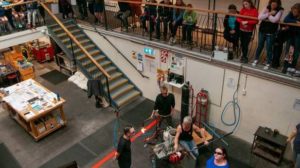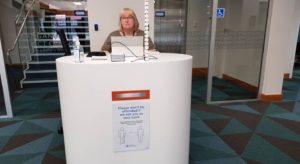21 Mar Coronavirus: Councils grapple with Covid-19 response
By Laurel Stowell, Reporter for the Whanganui Chronicle.

NZ Glassworks will close for the next two weekends.
Councils around the region are following coronavirus guidelines on minimising social contact to slow the spread of the illness.
While many Whanganui District Council parks, venues, and facilities are operating business as usual the Sarjeant Gallery and New Zealand Glassworks will be shut for this weekend and next.
With Artists Open Studios cancelled it was thought those two facilities could have an influx of visitors.
The Sarjeant has also cancelled its gatherings and events, and stopped offering its education programmes to schools.
The Splash Centre pool complex is closed until further notice due to Covid-19 risk and Ministry of Health advice on gatherings of more than 100 people.
Splash Centre manager Dave Campbell says more information will be available soon for people who have automatic payments for memberships or who have paid for a term of lessons for their children.
“However, we are reviewing the situation on a daily basis and have been actively preparing for this for over a month,” council chief executive Kym Fell said.
“Our focus is the health, safety and wellbeing of staff and the public in our workplaces and venues.
“We have business continuity plans in place to maintain the delivery of key services, and will be implementing these should the need arise.
“We have reviewed our council cleaning regimes and are satisfied that they meet current needs. We are ready to increase them if necessary.”
Two councils, South Taranaki and Rangitīkei, have encouraged people to conduct business by phone, email or website, rather than coming into council buildings.
Most are doing extra cleaning and sanitising of their public spaces.

Revenue officer Robyn Heenan is behind the front desk at Whanganui District Council – with a message. Photo / Laurel Stowell
Most still have council meetings happening, with councillors sitting as much 2m apart from each other in Ruapehu.
Some councils are asking visitors to their meetings to sign in with their name and phone number in case they have to be contacted for testing later.
Whanganui District Council meetings are filmed and can be watched on the council’s Facebook page.
Other councils are moving to virtual meetings, using information technology.
Rangitīkei, Whanganui and South Taranaki have all formed incident management teams, which meet regularly and keep up with the latest in the rapidly changing picture.
All are cancelling events with more than 500 people. Rangitīkei has cancelled its Marton Harvest Festival and Pedal For Pleasure event, and South Taranaki has postponed the XRACE in Hāwera.
All the councils are preparing for times when staff will work from home. At Whanganui some are working from home, in self isolation because they have been overseas recently or have had contact with someone tested for Covid-19.
Work has to continue as usual, and people have to keep their jobs. Building consents and other council services are unaffected so far.
Rangitīkei’s mayor and chief executive are reminding people to shop local.
“While being mindful of the requirement for ‘social distancing’ we encourage you to continue to support local businesses, this is a very difficult time for them,” they said.
Horizons Regional Council has a civil defence role across the wider region.
Pandemic response will mainly be down to the Ministry of Health, chief executive Michael McCartney said, but it activated its Emergency Co-ordination Centre in Palmerston North on March 16.
The centre provides regional co-ordination of any pandemic response. It will still be able to respond to other emergencies, such as floods and earthquakes.
Click here to see the original article at nzherald.co.nz

